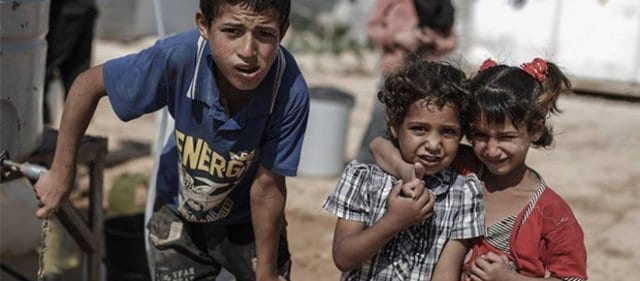New Zealand falls well short of its fair share of international contributions to the Syria crisis

New Zealand falls well short of its fair share of international contributions to the Syria crisis
Oxfam’s new report, Solidarity with Syrians, analyses the “fair shares” of rich and powerful countries to provide money, resettlement places for Syrian refugees and leadership to end the bloodshed.
The report found that New Zealand has provided just 11% of its fair share of funding and only 41% of its fair share of resettlement places to the international response.
Urgent action needed
Rachael Le Mesurier, Executive Director of Oxfam New Zealand said: “The international community has failed so far to address the spiralling catastrophe in Syria. The arrival of tens of thousands of Syrians to Europe’s borders and the shocking deaths of women, children and men on their perilous journey has been a sharp reminder of the tragedy engulfing the people of Syria. Syrians put themselves and their families at so much risk only out of sheer desperation.
“Oxfam is calling for urgent and immediate action by the international community to deal with this deepening crisis: to fully fund the aid response, to offer refuge to those who have fled the country including through resettlement of a fair share of the refugee population, to halt the transfer of arms and ammunition and to revive concerted efforts towards a resolution of the crisis.
“Kiwis believe in a fair deal. While we welcome the Governments recent commitment to offer a safe haven to 750 Syrian refugees – over three years – Oxfam is calling on New Zealand to do more to help some of the millions of increasingly desperate Syrians who have fled for their lives – we can, and must do more, with urgency,” said Le Mesurier.
“Woefully inadequate”
Oxfam says aid flows are woefully inadequate for Syrians to live in dignity and safety, and many countries are simply paying lip-service to their commitments to give safe haven for those who have managed to flee. Only 17,000 Syrians have been so far resettled in a third country due to lack of political will to honour the pledges already made.
Some countries are performing better than others – for example Australia has pledged 126% of its fair share of refugee places to Syira – but it is hard to find many champions that meet their fair share of funds contributed as well as refugee places, beyond Syria’s near neighbours and the laudable exceptions of Germany and Norway. The report shows that while some donor countries might perform relatively well in some areas, many are failing badly across the board, including New Zealand.
“Refugees from Syria and other countries have the right to be free from violence, to aid for basic needs and dignity, and to a safe haven,” said Le Mesurier. “They are being short-changed on all three fronts which is driving a good proportion of the EU refugee crisis we’re seeing. There will be no end to the suffering until action is taken on these issues – both globally, and at home.”
Oxfam’s report found:
- The international community is not preventing the escalating violence or doing enough to ensure civilians are protected inside Syria. And only a handful of countries can say they are doing their fair share in providing aid and resettling refugees: Russia (aid 1%, resettlement none) and France (aid 22%, resettlement 5%) have registered poor results on both counts.
- The United Kingdom, the United States, and Kuwait, while giving considerable funds (the percentage of their fair share in aid is 229%, 72% and 538% respectively) have been less than generous in their offers to welcome the most vulnerable refugees (the percentage of their fair share is just 26%, and 8% while Kuwait has not resettled refugees.[1]
- Germany and Norway lead the way, giving generously in terms of aid (percentage of their fair share is 75% and 186% respectively), and resettlement (percentage of their fair share is 112% and 293% respectively).
- By comparison, Jordan, a host country, is estimated to have spent $870m[2] a year in relation to the Syria refugee crisis – which represent 5,622% of its fair share.
Aid response faltering
As the barrel bombs, massacres, air strikes and mortars continue inside Syria, aid is drying up and living conditions in neighbouring countries are toughening. The Syrian displacement crisis is spreading and deepening. Oxfam says that unless addressed, these failures – along with a continuation of the bloodshed and fear – will intensify the Syrian refugee crisis and entrench it for a generation.
“The aid response is faltering due to lack of funds – or more accurately, the lack of political will to loosen up funds. Rich countries have ignored repeated alarm bells. The most vulnerable refugees, who make up 10% of the registered Syrians, are in urgent and desperate need of resettlement places.
“The violence in Syria is intensifying, fuelled by a divided international community and the transfer of arms and ammunitions to warring parties. Faced with this grim situation, many Syrians are literally jumping in the water to seek a better future,” said Le Mesurier.
[1] Kuwait has not signed the Refugee Convention, therefore it is not included in our analysis
[2] A study estimated in 2013 that Jordan would spend JD617 million ($870 million) for a refugee population of 635,000 (http://dai.com/news-publications/news/calculating-fiscal-cost-jordan-syrian-refugee-crisis). We assume similar spending for 2015, as the refugee population in Jordan is now 628,000 people.





